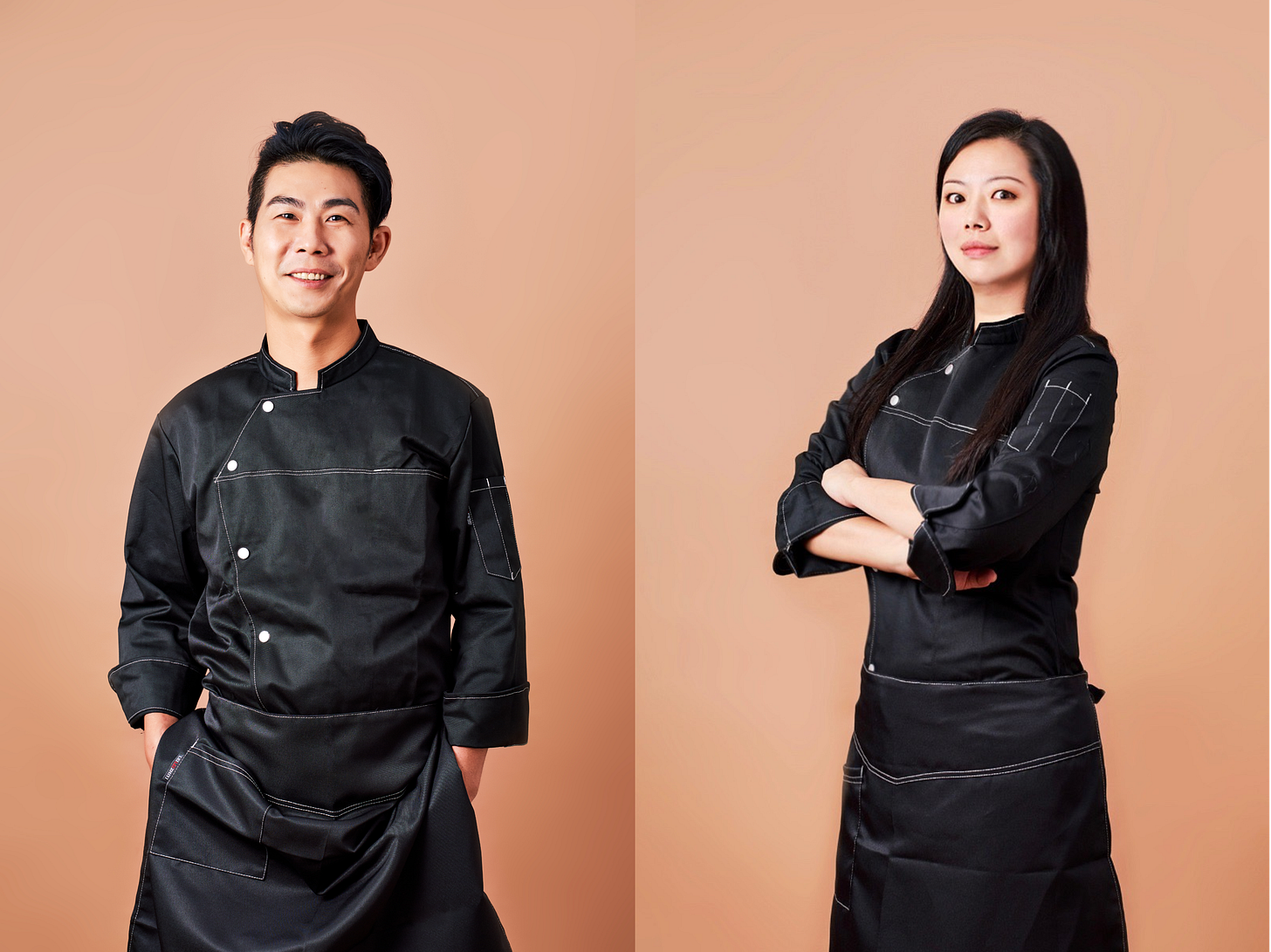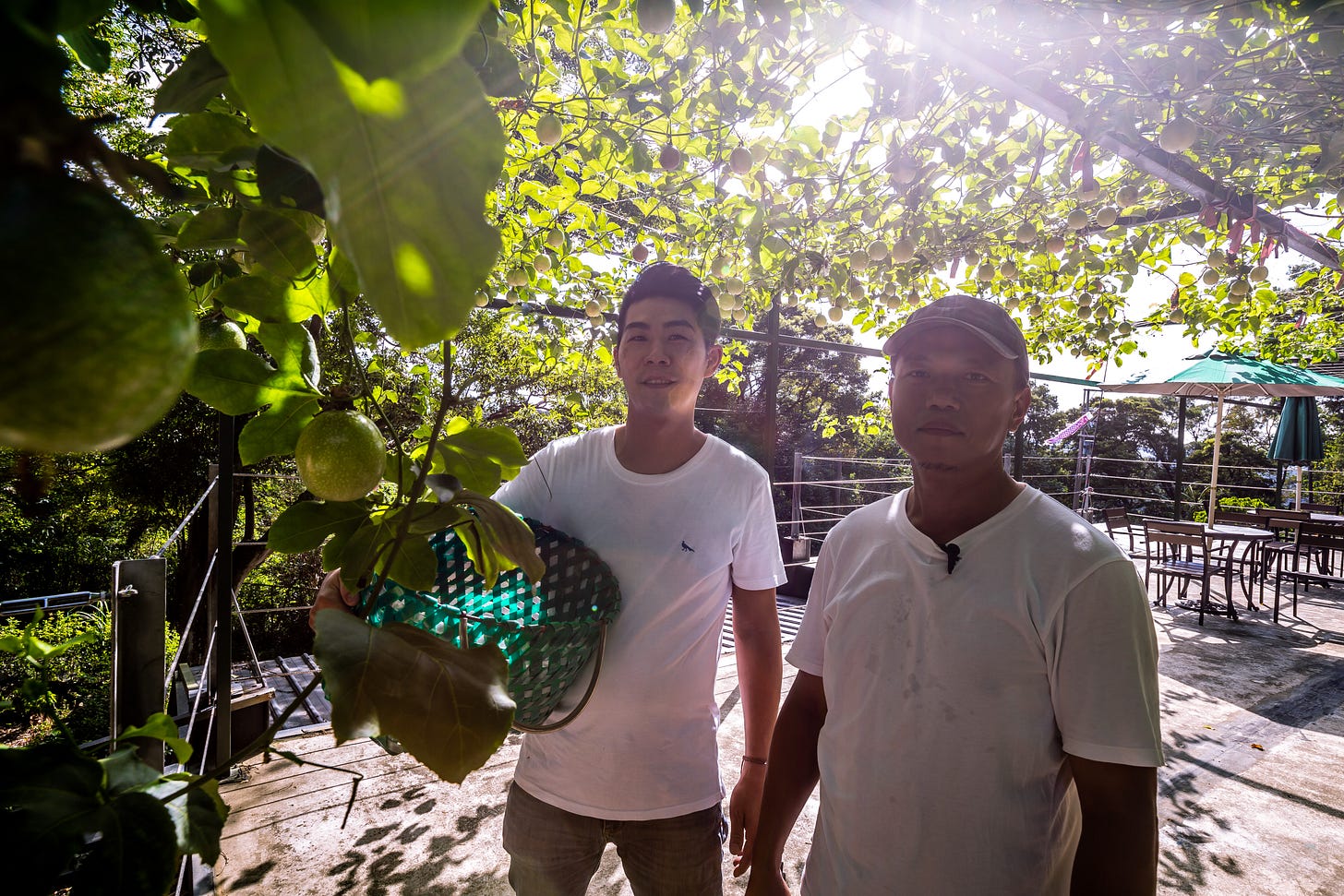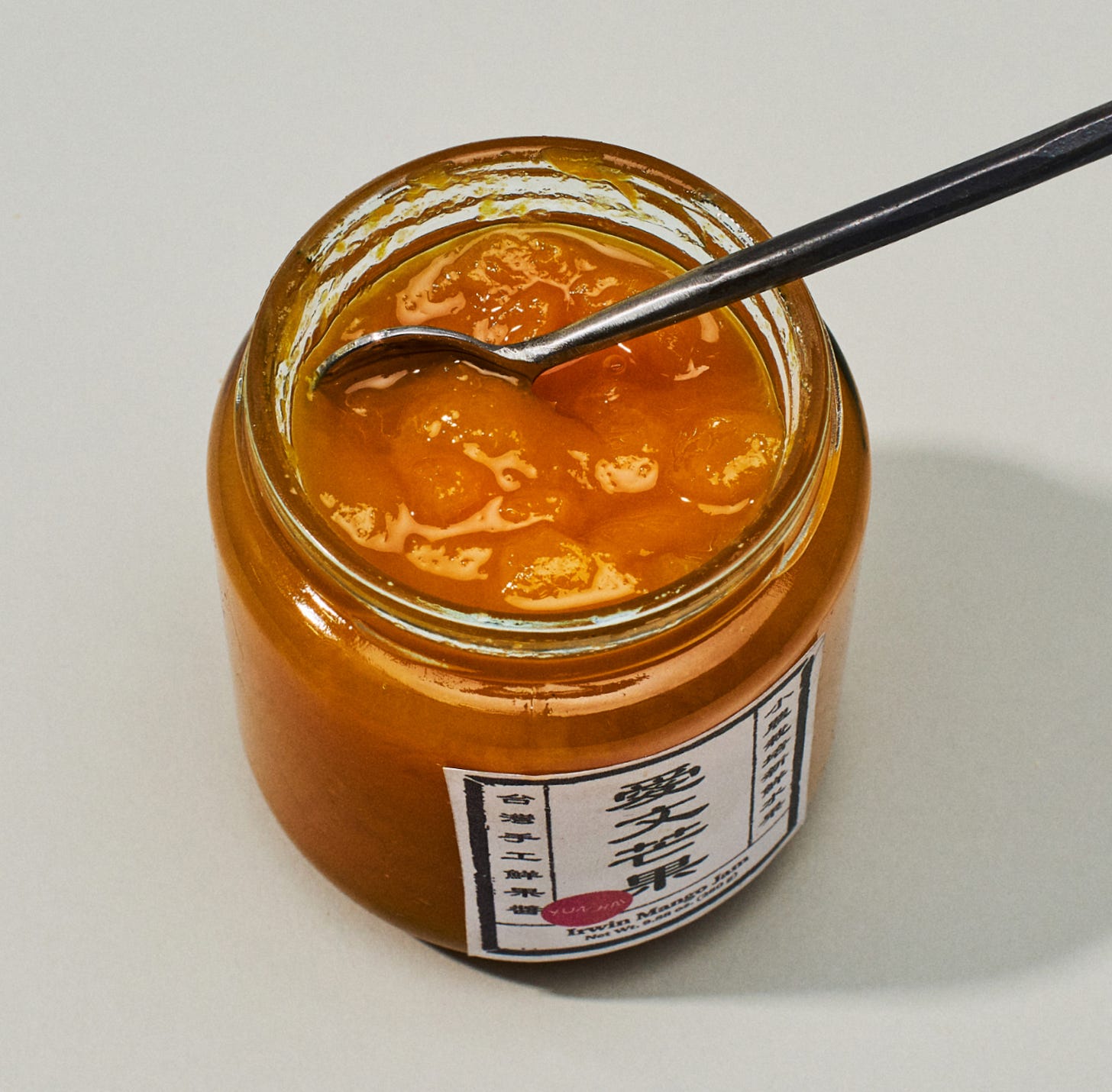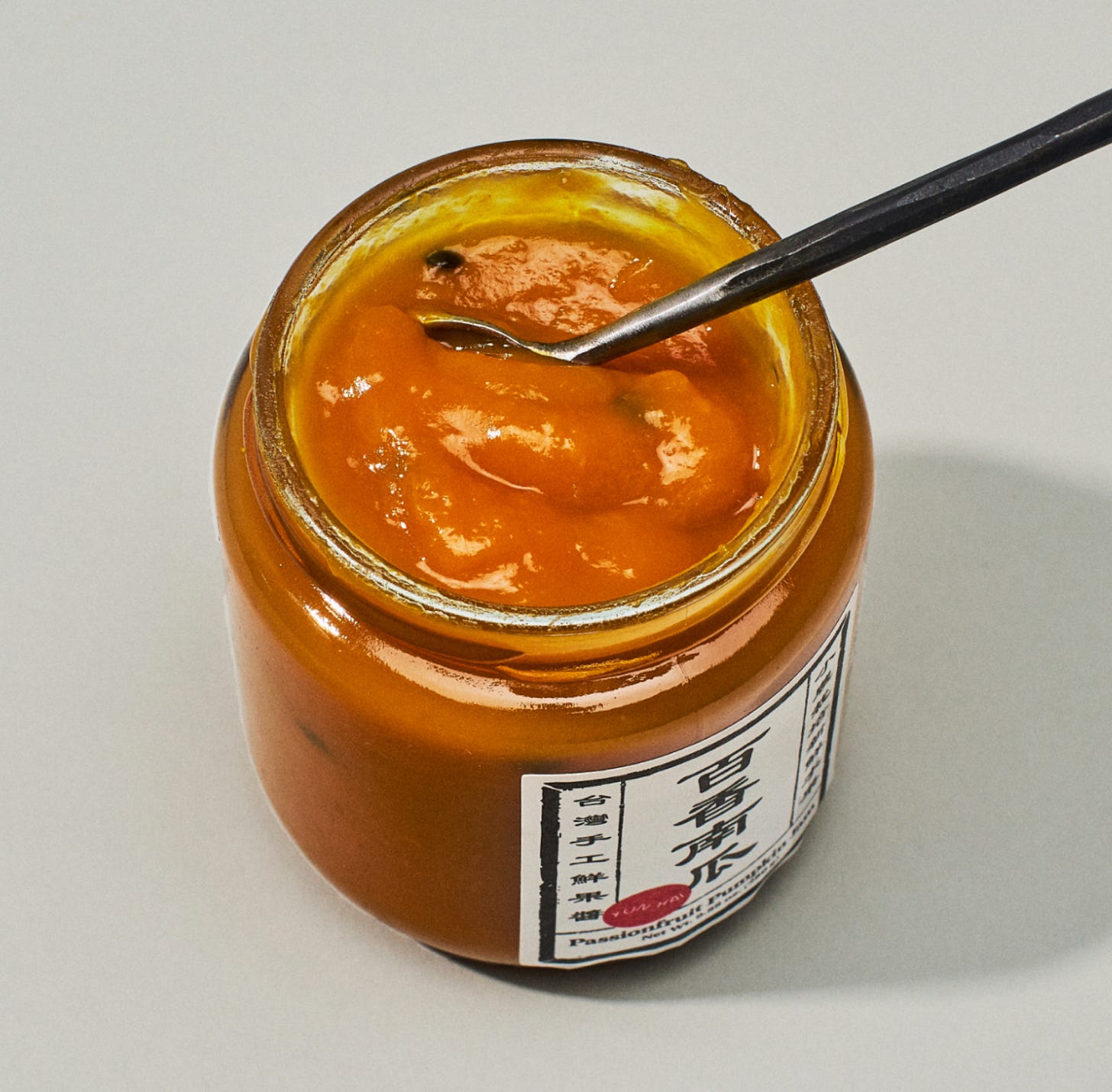鮮果醬: It's My Jam
Our new line of Taiwanese fruit preserves and a sneak peek at what's to come this holiday season
This is Yun Hai Taiwan Stories, a newsletter about Taiwanese food culture by Lisa Cheng Smith 鄭衍莉, founder of Yun Hai Taiwanese Pantry. If you aren’t yet a subscriber, sign up here.
Today, we launch our second foray into the world of Taiwanese fruit: a new lineup of jams, made by a small-batch jam maker in Taipei. These are not your typical jams! They feature large pieces of fruit, no added pectin, and are much less sweet than your everyday grocery store variety. They are delicate and fresh, preserving the flavor and textures of in-season fruit in Taiwan, which is a love language all its own. Read on for more, stay tuned to our Instagram for recipes and in-person tastings, and look out for our holiday specials starting next week.
Sheng Wang is a forty-something, Taiwanese-American stand-up comic that grew up in Houston (like me) with a deadpan observational style (like me?). No wonder I love him. His Netflix special, released last year and directed by Ali Wong, is aptly named "Sweet and Juicy," which is not a reference to the qualities of a sexy and lovable person, but literal descriptors of fruit. In-season fruit, to be specific, and how much “grown Asian people” (his words) love it. And that to successfully date and love such people, you need this knowledge. I like this joke.
Fruit played a key role in my experience growing up as a Taiwanese-American. I have visceral memories of shaking the neighbor's kumquat tree and enjoying lychees purchased in the parking lot of the Chinese grocery. Memories of visiting Taiwan, encountering seasonal fruit everywhere, and eating it with abandon: tomatoes stuffed with plums, crunchy wax apples, kiwi juice, tamarillos in the mountains, and even cactus fruit on the islands of Penghu. Diverse and high quality fruit is one of the great products of Taiwan's economy—better than semiconductors, by any measure of mine. See below for a fruit and juice shop on Yongkang street in the Da’an district of Taipei:
In my family, fruit is indeed a language of love. And accepting gifts of fruit (no matter how overwhelming) is the language of I-love-you-too. Do not throw away fruit, or risk sending the message that you are also willing to throw away love. Do not misinterpret cut fruit as simply a healthy dessert, or risk missing signals of approval and acceptance.

My mother rarely lets me peel my own orange in her presence. Just the other night, she skinned a pomelo with her bare hands, as the family sat around lazily. No knife in sight. And instead of handing pith-covered pieces around the table, she ripped the white layer away with her fingers, until the fruit was bare, just a thin membrane separating us from the treasure inside. Pomelos are a pain to process; this is profound affection.
As a card-carrying fruit freak, I relate deeply to Sheng's bit. I’m half-Taiwanese and my husband is half-Dutch. When we first started dating, he would go to the grocery store and come back laden with many shopping bags and plenty of pickles, but NO FRUIT. Early on, I thought this was maybe a red flag (how could he?!); but now I know his love language is granola and sourdough. Over time, I've come to regard the bulk orders from Nuts.com and Anson Mills as expressions of care and tenderness. But there is a thriving mulberry tree near our parking garage that he shakes down once per season, and that's how I know we're a family.
Taiwanese Fruit Jams
If accepting the gift of fruit is the language of I-love-you-too, enjoying Taiwanese fruit is a way of loving Taiwan itself.
In 2021, Lillian and I started our dried fruit line as an act of love. When China banned imports of Taiwanese pineapples just before harvest season, 90% of Taiwan's export market was decimated. People all over Taiwan and throughout Asia did what they could to consume Taiwan’s surplus pineapple, throwing the farmers a lifeline. I had always wanted to import dried fruit from Taiwan, and thought that if perhaps the farmers could preserve their pineapple, we could collect preorders. Lillian and I put our heads together on this, and our line of dried fruit was born; it’s still going strong today. (Since we launched, by the way, wax apples and mangoes have also been added to the ban list.)

As small as this gesture was in the geopolitical soup we live in, it is our way of contributing positively to the forces in this world, and to show our care and respect for Taiwanese fruit and its farmers, many of whom are continuing their family's line of work and revitalizing it. Trade is the basis upon which these farmers exist, and it's one way we can participate in their efforts.
We're extending that gesture today with our launch of Taiwanese Fruit Jams, a line of small-batch fruit preserves made in Taiwan by a family-owned, small-batch jam maker. The lineup includes: Red Guava, Irwin Mango, Passionfruit Pumpkin, and Mulberry.
They are nothing short of a delight. Spread them on toast, bake them into cookies, spoon them onto ice cream, and try not to eat the whole jar with a spoon. Early reviews include "They are SO good?" (anonymous Dwell editor) and "Wow, I would just eat that by itself" (overheard in the office).
These indeed are SO good? And for me, they bring on a mix of feelings: delight, familiarity, homesickness, absence, and presence all at once. Something akin to filial love.
Jam Making as Preservation
Many different kinds of fruit are grown throughout Taiwan year round, and when the harvests come, they come fast. Some years are more bountiful than others, and some less. To preserve the surplus (and have things to sell during unproductive seasons) is an important part of fruit farming. In Taiwan, by my own observation, you'll see dried fruit (of course), but also brined fruit (a la salty plums and green mango), smoked fruit (smoked longan), fruit vinegars, candied fruit (pomelo and kumquats preserved in syrup), and fruit tea, which is essentially the same thing as jam, but stirred into hot tea or water. Farmers associations and specialty processors exist to help convert harvests into shelf-stable products, often with the farmer's own recipes.
Our new fruit jams are made, with care, by Taiwanese fruit masters (and married couple) Dolly and Chin. These jams are quite different from the thick, smudgey-sweet, conventional spreads (no shade) that you may be used to. With no added gelling agent, our jams are loose in texture, featuring large chunks of fruit, processed gently to capture their freshness. They're spoonable and spreadable, and make a great topping for breads, ice cream, yogurt, or a green tea pound cake.
Dolly and Chin have been in the business of fruit for multiple generations. Originally, Chin took over his family's wholesale fruit and vegetable distribution business. They bought direct from farmers and farmers associations and sold to restaurants and hotels well before dawn every morning. Eventually, they wanted to try their hand at a more direct-to-consumer fruit-based business (and maybe wake up slightly less early?), so they opened a juice and cut fruit shop in Taipei, one of those glorious little stands swathed in the bright colors of produce. They were close with many farmers, and sold the produce of their friends.
Not long after, convenience stores in Taiwan began to sell cut fruit and juice, which created steep competition and a difficult market. At the suggestion of their friends, they turned their attention to jam production. With no prior experience making jam (but plenty making juice and cutting fruit), they taught themselves the craft and experimented with recipes until they deemed their jam was just right. They initially sold at outdoor markets and fairs across Taiwan and created jams for farmers and house brands like ours.
When Lillian and I were sampling jams across Taiwan to develop this line, Dolly and Chin's jams stood out to us because their flavors and textures were so fresh. The fruit is hand peeled and stewed whole or in large pieces to preserve texture and pulp. Only sugar (a natural preservative) and lemon juice are added, and the fruits are slow cooked to encourage the release of their own natural pectin, which sets the jam.
They make the jams in small batches as a matter of preference and principle, cooking it in micro-batches over portable butane burners (yes, the same kind you may use for hosting hot pot at home). The little stoves provide more sensitive control over flame, and the stockpot is the optimal size for preserving the nuances of the fruit. Just like a friend would make.
A Thought on Process (and Processors)
As you know, agriculture is at the heart of Yun Hai. I'm not a farmer, nor the descendant of one, but I have immense regard for this age-old human endeavor. It's a craft and a culture. You can't drop an apple seed in the ground and expect a good apple, you have to graft, prune, watch, wait, care. It’s constant stewardship.
There is a bucolic picture of healthy agriculture that we're all familiar with: rolling fields, neat and tidy rows, heirloom-breed chickens scratching around, a tidy farmhouse, maybe a cat and a dog. But farming doesn't always look like that. Fruit orchards in Taiwan can be tight or meandering, growing on hillsides, with structures many times repaired, sprawling vegetable gardens, and equipment spread all around. This is bucolic, too; it's the vernacular of work and labor, without which nothing comes.
Another aspect of smallholder agriculture that's often ignored in popular depictions are its processors and co-packers. Jam making seems like a delightful endeavor, and it is. But it's also one of many ways for farmers to process their produce into shelf stable products—a vital service to the grower and the consumer. It's an art as much as it is a vocation; Dolly and Chin are craftspeople at heart. And like craftspeople, they know their material well. When they first started out, they spent summers working on farms to study how fruits are grown and harvested, in pursuit of perfect jam.
Smallholder farmers and their processors exist together; it’s both an economy and a community. It’s easy to think of independent producers like this as “needing our support.” But I feel it’s the other way around: when we purchase and consume their goods, we’re being provided for, and are participants in their craft.
Red Guava Jam
This Red Guava Jam is made with guava grown by a self-taught fruit farmer who is close friends with the jam makers. They're ripened until tender, and the entire fruit—juice, fibers, seeds, and all—is simmered with sugar and lemon juice over a low flame until the natural pectin inside it is released. Red guava are a rarer variety in Taiwan, and are said to be slightly mellower and more sweet than the common pearl style.
We are delighted by the pure intensity of the guava aroma and the poppy-red color of the preserve, interspersed with flecks of yellow-green.
Irwin Mango Jam
This Irwin Mango Jam is one of the next best things to eating the fresh version of the fruit (the other is our Dried Irwin Mango, ha). Made with fresh Irwin mangoes, lemon juice, and sugar, this jam exudes a pure, pronounced mango sweetness, as well as the pulpy texture of the fruit itself.
The mangoes are sourced from Pingtung, a coastal county in southern Taiwan. The area’s marine biome imparts a nuanced sweetness to the mangoes grown there—and the terroir is reflected in the jam.
Mulberry Jam
This Mulberry Jam tastes as close to freshly crushed mulberries as you can get: tart, sweet, and almost blackberry-like. This preserve retains the texture of the entire fruit, complete with crunchy seeds. Mulberries may not get as much attention as mangoes or guavas, but in Taiwan, they grow easily—and are found everywhere. Taiwan even has its own varietal of mulberry, from which this jam is made.
Our jam maker shines a spotlight on the singular beauty of the mulberry, turning something commonplace into a gem of a preserve. If you hold it up to the sun, the dark colors of the jam reveal a spectrum of jewel-toned reds and purples glistening under the light.
Passionfruit Pumpkin Jam
This Passionfruit Pumpkin Jam is a unique flavor combination that our jam-makers experimented with to put a spin on one of the most charismatic Taiwanese fruits of all. Puli passionfruit, a bright zing of a thing, is combined with a native Taiwanese variety of pumpkin called A-Cheng 阿成, with a sweet mellow flavor. Compared to the other jams in our line, this one has a smooth, creamy texture—almost like apple butter. The addition of passionfruit brightens this velvety base with tropical piquancy.
The result is simply delicious: tart, tropical passionfruit hits the palate immediately, then mellows out into earthy, sweet pumpkin. There are passionfruit seeds in the jam, too. The occasional crunch makes for a lovely texture.
Jam Newspaper Packaging
When thinking through what a Taiwanese jam should look like, Lillian and I thought it should telegraph something that was distinctly Taiwanese. What would be our red gingham checkerboard top?
In Taiwan, and in Asian groceries in the states, newspaper and other printed matter are often recycled as packaging materials, used to wrap fragile things or even folded into an origami “trash can” for fruit peels and pits. In our store, we use old newspaper spreads from Taiwan’s national archives as wrapping paper, assembled for us by Taiwanese design studio O.OO and printed here by an Asian-American owned newspaper printer in Long Island City. (We actually tried using local Chinese-language papers first, but there’s just way too many photos of Trump and Biden in those pages.)
These retro newspapers would be our perfect red gingham, and O.OO interpreted this concept for us beautifully. Each paper cap comes from an old spread from the archives, and the label design is inspired by classifieds, as seen below. We included a little red tag to drive home that these jams are proudly Made in Taiwan.
In Other News
The holidays are upon us. I write this as I consider the frantic run up to Thanksgiving and all that needs to happen between now and then. Please stay tuned for our annual holiday sale; you’ll hear about it here first. And thank you in advance for your
supportparticipation this season!
We’re officially launching them next week, but if you’re curious please check out our 2023 Holiday Ga Ji Dai Gift Collection. Each assortment is curated around a specific theme and includes a special item. Plus, they’re packaged in a gorgeous box inspired by Ga Ji Dai, a traditional Taiwanese market tote.
And (also coming next week) look out for our very exciting, very cute, and very collectible dried fruit gift box set, inspired by fruit cartons seen in and around the markets of Taiwan.
And finally, we’ve got many in-store exclusives in our brick and mortar shop in East Williamsburg, not the least of which is the adorable, handmade, porcelain red stool pictured above.
On a more serious note, it’s difficult to write about love, care, fruit, and tenderness without feeling the immense weight of the pain and suffering in the world today. I am for an immediate ceasefire in the Gaza Strip and Israel and am taking personal actions in support of that goal. Out of the utmost sense of humanity, I urge you to follow your ethical compass in pursuit of peace.
With love,
Lisa Cheng Smith 鄭衍莉
Research and editorial assistance from Amalissa Uytingco, Jasmine Huang, Luke Miller, and Lillian Lin. If you enjoyed this newsletter, please share it with friends and subscribe if you haven’t already. I email once a month, sometimes more, sometimes less. For more Taiwanese food, head to yunhai.shop, follow us on instagram and twitter, or view the newsletter archives.



















Thanks so much!!
Hi! I was just wondering if Dolly and Chin's fruit jams are available to be purchased in Taiwan from their own store?